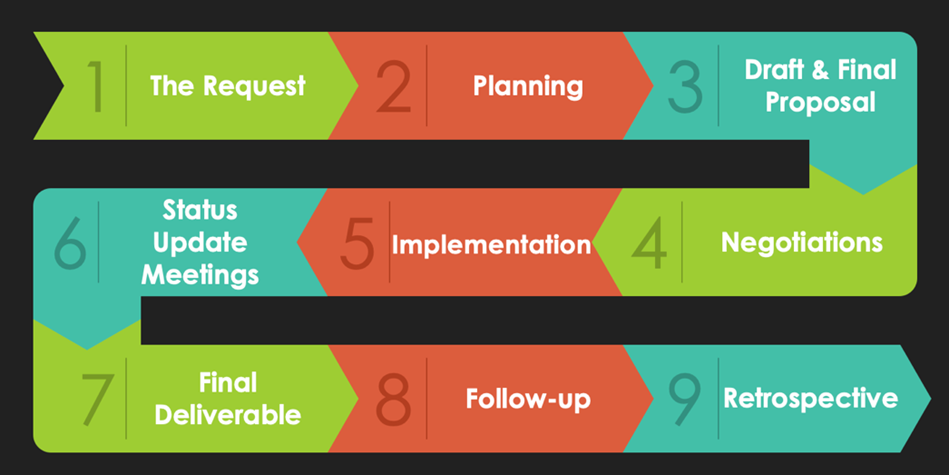How often do you have projects that bubble up unexpectedly? If you’re like my team and me, it’s pretty frequently. Projects can be kind of fun and exciting – a little something different to do! But making sure that the project doesn’t go off the rails, get mission creep, or – gulp – fail, is the key to looking forward to the next one. (Add usually is also the key to moving forward in your career). This week HBG Senior Consultant Angie Herrington shares lessons learned for managing projects successfully – while also (sometimes with a little help from a friend) keeping your sanity. ~Helen
 A project is a bundle of tasks necessary to create a solution. A simple definition but for our purposes we’re going to look at it as a process of creating a plan and managing it to keep it on track. Based on scope or size, a project’s complexity can be anything from an internal department screening verification to building a prospect management system.
A project is a bundle of tasks necessary to create a solution. A simple definition but for our purposes we’re going to look at it as a process of creating a plan and managing it to keep it on track. Based on scope or size, a project’s complexity can be anything from an internal department screening verification to building a prospect management system.
The Beginning
“Most people do not listen with the intent to understand; they listen with the intent to reply.” – Stephen R. Covey
Chancellor Bob “The Boss” Smith has come to you with a request. Your most important job right now? Stay quiet and listen. The Boss has an idea, and he may or not know what it will look like, but he needs a solution which is now your job. It’s then your turn to tactfully find out why this is needed, how is it going to be used, who will use it, and does he already have a visual of what it will look like. It’s possible The Boss won’t have any answers, but he has an idea and it’s an opportunity for you to help shape it because ultimately, you’re the subject matter expert.
Planning
“Failing to plan is planning to fail.” – Alan Lakein
A project is about creating a process involving multiple steps and/or people. Where do you start?
- Meet internally with your supervisor and team to prioritize it with other projects.
- Visualize the steps. Projects aren’t one-size fits all so do your best to estimate the time for each step, including meetings and administrative tasks.
- Meet with others who need to be involved and discuss their ideas, time estimates, and workload.
- Don’t forget to factor in your own time if you have other responsibilities or unrelated work and if you’ll need to delegate something.
- Ask more questions for clarification.
How can you stay organized? We don’t always have time to create or maintain flashy visuals, Gantt charters, or learn one of the many available planning software programs. There are people whose sole jobs are certified project managers. It doesn’t hurt to understand basic concepts from agile or scrum project management methodologies because the clock is ticking and knowing steps to keep a team collaborating on schedule and being accountable will make your life easier. For us we can use basic tools we’re already familiar with like spreadsheets, word documents, free online templates, online whiteboards, a calendar system, and other simple tools to get the job done to the best of our abilities.
Proposal and Negotiation
“Everything is negotiable. Whether or not the negotiation is easy is another thing.” – Carrie Fisher
Now that you know who and what you need it’s time to draft a proposal, so everyone understands the plan, timeline, and role. This is the time to clearly manage expectations. Including more than one option for The Boss to consider might help you manage the scope and time you’ve estimated and later during negotiations. Compromise, but be careful not to overpromise, propose or leave anything vague. Although it’s not always possible, work with the ultimate decision maker or keep them involved in some way to stay on track.
Document. Document. Document. Can you guess why I’ve stressed this detail? Do this from your first meeting to the last. Document changes to your proposal. The project itself or who you’re working with might be complex, so I also suggest having someone else in the room from the beginning to help take notes, catch anything overlooked, and make sure there aren’t misinterpretations.
Communication and Comprehension
“Communication sometimes is not what you first hear, listen not just to the words, but listen for the reason.” – Catherine Pulsifer
We all say communication is the key, but it means nothing unless there’s comprehension. Part of being an effective project manager is you’re also a translator. As researchers we have to know a little bit about everything and that includes our internal partners.
For example, you need data from your CRM and help from your database manager or the report writing team. During your planning stage bring everyone in on the full picture of the who, what, and why. Asking for XYZ could get you a .csv file with 300 columns and 10,000 rows when there might have been an option for a report with context. Have a basic understanding about the different groups you’re working with and put effort into understanding their terminology vs. The Boss’s. Adapting will make your life easier. You’re the negotiator working with a variety of personalities, skills, and work styles helping them understand their piece in the puzzle.
Implementation
“Ideas are easy. Implementation is hard.” – Guy Kawasaki
You’re now in the thick of it. Manage your progress with a tracker including tasks, status, and updates. Schedule regular meetings with agendas to add notes with who’s doing what and a focus on next steps. Similar to the Agile method, if it’s appropriate and you think productive, share your work in stages with The Boss to get input as you go.
Guess what? The Boss has a new idea or change to the project, and it will add more time. Ask, “what will this replace” or “that’s an interesting idea and something to consider as a phase two of the project.” We need to prioritize what’s most important vs. what would be nice if we had more time.
At some point you might have a meltdown and it’s good to remember suggestions like go for a walk, get fresh air, make a new friend with the person who stopped you from throwing your computer out the window. I made a discovery on a Sunday night during a series of email exchanges. (You’re probably thinking the lesson was never to reply to email off hours. That’s a great idea and I’ll add it to next year’s performance goals.) In this case I learned my Apple Watch has a heart rate monitor that will trigger if my beats per minute goes over 120 after 10 minutes of sitting. The second time it went off an hour later I made another discovery. My husband knows how to block websites like my email account on our wireless router and where to hide my cell phone.
 You’ll find times when you have to stop and ask yourself “is this reasonable?” or “is this worth it?” and need to go back to negotiate. If you find yourself in this situation, remember what we do isn’t going to end the world. Remind yourself of the bigger picture. If your own efforts to bring the project back to a manageable level isn’t working, ask for an outside perspective or your manager to step in to help.
You’ll find times when you have to stop and ask yourself “is this reasonable?” or “is this worth it?” and need to go back to negotiate. If you find yourself in this situation, remember what we do isn’t going to end the world. Remind yourself of the bigger picture. If your own efforts to bring the project back to a manageable level isn’t working, ask for an outside perspective or your manager to step in to help.
Retrospective
“Regardless of what we discover, we must understand and truly believe that everyone did the best job he or she could, given what was known at the time,
his or her skills and abilities, the resources available, and the situation at hand.” – Norman Kerth
The project is done! A retrospective session is the final piece of the documentation process and will give you and/or your team time to reflect. Discuss your successes, complications (missteps and/or those out of your control), what you would do differently, and any next steps. It will help everyone understand your work, The Boss might remember where your office is and have another great idea, and you’ll inevitably do something similar again. We learn from the past and (hopefully) know what not to repeat or will work better next time.
Most importantly and I can’t stress this enough, thank those who helped. The Boss may have moved on and will never be aware of your efforts or the benefits of an Apple Watch’s heart monitor. You can be better because you were there with everyone else. A little gratitude makes a big difference to them and for you.
Lessons Learned
“Some lessons can’t be taught. They simply have to be learned.” – Jodi Picoult
Sometimes project management is an attempt at good intentions. Do I practice what I preach? No comment. I learn something every time that helps me with the next project. I’ve tried to get ahead on known projects and never heard a peep until two days before the deadline. There’s that saying, “your lack of planning is not my emergency.” Periodically check in with your development officer on their goals and your potential role. Remember to manage other’s expectations and especially your own. It’s easier said than done but that’s one of the lessons I’ve learned along the way and will hopefully practice the next time.

